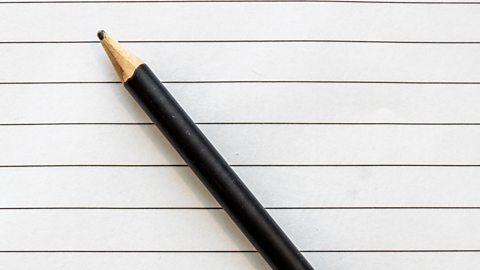In this article you can find out:
- What a source is
- The importance of using reliable sources in your essay writing
- How to evaluate a source
This resource is suitable for broadly discursive essay writing for S1, S2 and S3 (Third and Fourth Level Curriculum for Excellence).
What is a source?
After you have chosen a topic for your broadly discursive essayAn essay that requires you to look at a subject and present well-researched information or an argument about a topic., you will need to research to make sure you have relevant information to support the key points in your essay.
You can get information from a variety of sources. For example, you might find information from:
- print media, such as books, newspapers and magazines
- broadcast media, such as television and radio
- online media, such as websites and social media
The importance of using reliable sources
Just because something has been posted online or in print does not make it wholly reliableA source that is consistently accurate and trustworthy. as a source of information.
When you are conducting research (whether for an essay for English, Art, Science or another subject) you should aim to access the best quality sources possible. This will require you to evaluate To judge the value or worth of someone or something. the source that you are reading and to decide quickly whether or not the information within this source will support and improve your essay.
How to evaluate a source
To evaluate a source, begin by asking yourself:
- Who has written/published the information?
- What information are we being given?
- Why has this information been written/published?
Evaluating a source gives you confidence in the quality of the information that you are being given.
¸é±đłľ±đłľ˛ú±đ°ů…
We are surrounded by many different sources of information, not all of it is accurate or reliable. In particular, anyone can post information online, so it is important to be able to work out who we should be listening to/believing.
Who?
Which of the listed people or organisations in the box below are considered reliable sources of information?
- A journalist
- A blogger
- An expert in the field
- A registered organisation or charity (an organisation/charity that has been legally registered with the government and follows certain rules and regulations)
- A government agency
- An anonymous author
- A vlogger
- A reviewer
- As a general rule, vloggers and bloggers are not considered reliable sources of information. They do not have to justify their views by calling on research findings and their content does not usually go through an editorial process. An editorial process is a series of steps used to ensure the accuracy and quality of a piece of writing. For example, the editorial process often includes a check for plagiarism and a peer review.
- A reviewer might be a brilliant reviewer, but we should also consider whether or not they are impartial. For example, are they being paid to promote a particular product? A reviewer is also giving their opinion, rather than objective facts.
- Anonymous contributors are problematic as we do not know who they are, why they are writing or what their information is based on. We cannot hold them accountable for the information provided.
- We would expect sources produced by registered organisations, such as NHS or Oxfam, to be accurate and produced by experts.
- The views of an expert in a particular field ought to be reliable, given that they have extensively researched that area and are incredibly knowledgeable on the topic.
- While journalists must uphold standards, content in newspapers or online news sites might lean towards particular political opinions or parties (depending on the company’s ownership). You need to consider if the information presented is biased.
What?
The next step on evaluating a source is thinking about what information we are given in it.
Here are some examples of types of information we might come across
| Type of information | Definition | Example |
|---|---|---|
| Statistics | Collecting, analysing, organising and presenting data. | '59% of UK households reported owning at least one type of pet.' (Source: Statista) |
| Views of expert | Information from a person with specific knowledge of a topic or field. | 'An expert from The Royal Veterinary College says…' |
| Advertisement | Media that encourage you to buy things or have a particular point of view. Remember, advertisements will often give positive information that will require balance. | 'This is the best dog food in the world!' |
| Factual information | Information that deals with facts, not opinions. For example, factual information could come from an encyclopaedia entry. | 'A dog is a domesticated carnivorous mammal.' |
If you find a statistic you want to use, think carefully about how you are going to use that statistic to add value to what your own argument.
¸é±đłľ±đłľ˛ú±đ°ů…
In your essay, you will have to explain the importance of the evidence that you have found. Make sure that you fully understand:
- what is being conveyed
- why a writer has included it
Why?
A final consideration we must make in evaluating a source is thinking about why that source has been produced.
| Source | Purpose |
|---|---|
| NHS leaflet | To inform patients about conditions/procedures etc |
| A government report | To present findings of research/enquiry |
| A blog | To convey personal response/opinions |
Challenge: check your sources
How reliable are the sources you are using for your essay research?
Once you have a list of sources for your essay, evaluate To judge the value or worth of someone or something. each source quickly using the three step who/what/why method.
- Who has written/published the information?
- What information are we being given?
- Why has this information been written/published?
More on Discursive, persuasive and informative writing
Find out more by working through a topic
- count4 of 13

- count5 of 13

- count6 of 13

- count7 of 13
